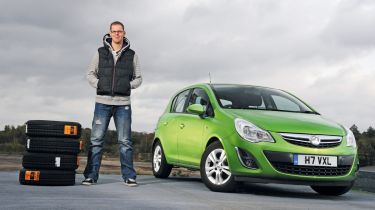Vauxhall Corsa: Third report
Having wrapped up himself, our man turns attention to readying supermini for winter

The clocks have gone back and the temperatures are starting to tumble. But while it takes me seconds to put on some gloves and a hoodie to keep warm, preparing a car for winter is much more involving.
In my role testing accessories for the magazine, I know how crucial it is to look after your car when the temperatures drop. So I thought my Vauxhall Corsa would benefit from a set of winter tyres.
There’s nothing wrong with the Continental EcoContact3 summer tyres on the 15-inch alloys at the moment. They’re not wearing abnormally fast, nor have I noticed a decline in grip. But as our tests have shown, winter tyres are far superior to standard rubber as soon as the temperature falls below seven degrees Celsius. So with the mercury reading five degrees on my commute, now seems the perfect time to switch.
I’ve just taken delivery of a set of our test-winning Continental ContiWinterContact tyres. Costing £59.64 a corner, they’ll be fitted in the next few days, and I’ll let you know what difference they make in my next report. But the tyres have already highlighted just how practical the little Vauxhall is.
After taking out the parcel shelf and folding the rear seats (they drop forward almost flat), I managed to fit all four tyres upright in the back. And this isn’t the first time the car has surprised me with its load carrying ability.
Used - available now

2022 Vauxhall
Corsa
19,670 milesManualPetrol1.2L
Cash £10,887
2020 Vauxhall
Corsa
37,207 milesManualPetrol1.2L
Cash £8,700
2021 Vauxhall
Corsa
35,702 milesAutomaticPetrol1.2L
Cash £12,300
2023 Vauxhall
Corsa
41,061 milesManualPetrol1.2L
Cash £9,587It has impressed in other areas, too. I took the Corsa to Silverstone for the final round of the British Touring Car Championship last month, and it completed the 110-mile round trip from my Hertfordshire home on a quarter of a tank of diesel. This was one of many long journeys during a recent spell that saw me average an impressive 54.3mpg over 568 miles. The cruise control boosts economy on the motorway, while the stop-start has helped in town. Over the 2,232 miles since my last report, my average economy has risen from 47.9 to 48.3mpg.
But that’s not to say I think the Vauxhall is perfect. Although the engine has loosened up slightly, it’s still gruff. It’s noisy in town and on the motorway, so I’m forced to turn my iPod up to drown out the din.
Being able to plug my MP3 player into the Corsa’s stereo is great, as is the fact the device is charged in the process. Yet when I get to my destination, there’s nowhere to hide it – because the glovebox is so annoyingly small.
This is a result of cost-cutting in the conversion from left to right-hand drive. The bulky fusebox is still in its Continental location on UK cars, so there’s barely enough room in the glovebox for the handbook,
never mind an iPod or anything else. If you have any valuables, you have to lock them away in the boot or take them with you.
It’s things like this that annoy me about the Corsa. The car is meant to represent cut-price motoring – and in some ways it achieves this, with low emissions meaning exemption from road tax and London’s congestion charge. But to get everyday kit like a trip computer and alloy wheels, you have to spend a lot. Our car costs £17,600, which is anything but cut-price for a supermini.
Extra Info
“The Corsa is meant to be environmentally friendly, and it’s certainly economical. But it has a real problem with noise pollution – the engine is very intrusive on the motorway and continues to vibrate at lower speeds.”
Graeme Lambert, road tester







